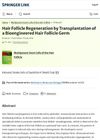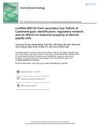 7 citations,
August 2020 in “Animal biotechnology”
7 citations,
August 2020 in “Animal biotechnology” A specific RNA in cashmere goats helps improve hair growth by interacting with certain molecules.
 August 2019 in “Stem cells”
August 2019 in “Stem cells” New treatments for hair loss, fertility, and wound healing are being explored.
 2 citations,
January 2022 in “Stem cell biology and regenerative medicine”
2 citations,
January 2022 in “Stem cell biology and regenerative medicine” Extracellular vesicles, including exosomes from certain cells, can stimulate hair growth.
 5 citations,
March 2020 in “Cell and Tissue Banking”
5 citations,
March 2020 in “Cell and Tissue Banking” Injected cells show potential for hair growth.
 31 citations,
February 2014 in “Journal of dermatological science”
31 citations,
February 2014 in “Journal of dermatological science” Placental growth factor may help treat hair loss.
 19 citations,
December 2015 in “Journal of Materials Chemistry B”
19 citations,
December 2015 in “Journal of Materials Chemistry B” Scientists have created a method to deliver specific cells that can regenerate hair follicles, potentially offering a new treatment for hair loss.
 25 citations,
August 2010 in “Acta Biomaterialia”
25 citations,
August 2010 in “Acta Biomaterialia” Researchers developed a method to grow hair follicle cells for transplantation using a special chip.
 6 citations,
January 2016 in “Methods in molecular biology”
6 citations,
January 2016 in “Methods in molecular biology” Scientists have developed a new method using stem cells to grow and transplant hair follicles, which could be useful for hair regeneration treatments.
5 citations,
December 2020 in “Bioengineering & translational medicine” Researchers used a laser to create advanced skin models with hair-like structures.
 27 citations,
March 2018 in “Biomaterials”
27 citations,
March 2018 in “Biomaterials” Three specific proteins can turn adult skin cells into hair-growing cells, suggesting a new hair loss treatment.
 29 citations,
April 2020 in “Journal of Tissue Engineering and Regenerative Medicine”
29 citations,
April 2020 in “Journal of Tissue Engineering and Regenerative Medicine” The experiment showed that human skin grown in the lab started to form early hair structures when special cell clusters were added.
 6 citations,
February 2014 in “Experimental Dermatology”
6 citations,
February 2014 in “Experimental Dermatology” Hair follicle regeneration is possible but challenging, especially in humans, due to the need for specific cells and a better understanding of how they signal growth.
 63 citations,
September 2009 in “Regenerative Medicine”
63 citations,
September 2009 in “Regenerative Medicine” Scientists found a way to grow human hair cells in a lab that can create new hair when transplanted.
 2 citations,
April 2021 in “International Journal of Molecular Sciences”
2 citations,
April 2021 in “International Journal of Molecular Sciences” The study concluded that changing the culture conditions can cause sika deer skin cells to switch from a flat to a 3D pattern, which is important for creating hair follicles.
 8 citations,
September 2017 in “Journal of Investigative Dermatology”
8 citations,
September 2017 in “Journal of Investigative Dermatology” CXXC5 is a protein that prevents hair growth and could be a target for hair loss treatment.
 44 citations,
June 2018 in “Journal of Cellular Physiology”
44 citations,
June 2018 in “Journal of Cellular Physiology” Researchers developed a 3D model of human hair follicle cells that can help understand hair growth and test new hair loss treatments.
 12 citations,
August 2020 in “Frontiers in Genetics”
12 citations,
August 2020 in “Frontiers in Genetics” H19 boosts hair growth potential by activating Wnt signaling, possibly helping treat hair loss.
 2 citations,
July 2020 in “Electromagnetic Biology and Medicine”
2 citations,
July 2020 in “Electromagnetic Biology and Medicine” Low-frequency electromagnetic fields help regenerate hair follicles using a mix of skin cells.
 13 citations,
April 2020 in “Experimental Cell Research”
13 citations,
April 2020 in “Experimental Cell Research” PCAT1 helps hair growth by controlling miR-329/Wnt10b.
 18 citations,
January 2019 in “Animal Biotechnology”
18 citations,
January 2019 in “Animal Biotechnology” A newly found RNA in Cashmere goats may play a role in hair growth and development.
FGF5 spliceosomes inhibit rabbit hair growth by affecting gene expression.
 4 citations,
September 2020 in “PeerJ”
4 citations,
September 2020 in “PeerJ” Platelet factor 4 slows down hair growth and could make hair loss treatments more effective if removed.
 October 2023 in “Scientific Reports”
October 2023 in “Scientific Reports” Oxytocin may help hair grow by increasing hair growth-related genes and factors.
 September 2022 in “Frontiers in Bioengineering and Biotechnology”
September 2022 in “Frontiers in Bioengineering and Biotechnology” Taxifolin from Rhododendron mucronulatum may help prevent hair loss and promote hair growth.
 4 citations,
May 2018 in “Electronic Journal of Biotechnology”
4 citations,
May 2018 in “Electronic Journal of Biotechnology” All-trans retinoic acid at high doses harms goat hair growth cells and could be bad for hair growth.
 2 citations,
March 2022 in “Applied sciences”
2 citations,
March 2022 in “Applied sciences” Lespedeza bicolor extract promotes hair growth and increases hair follicle cell growth, potentially making it a better treatment than minoxidil.
 18 citations,
April 2019 in “Archives of Dermatological Research”
18 citations,
April 2019 in “Archives of Dermatological Research” Lactoferrin helps mice grow hair by increasing cell growth and hair follicle development.
 113 citations,
November 2017 in “Scientific Reports”
113 citations,
November 2017 in “Scientific Reports” Tiny particles from stem cells help activate hair growth cells and encourage hair growth in mice without being toxic.
July 2017 in “Biology bulletin/Biology bulletin of the Russian Academy of Sciences” Specific conditions are needed to keep hair follicle cells effective for hair growth.
 2 citations,
January 2023 in “Scientific Reports”
2 citations,
January 2023 in “Scientific Reports” HIF-1α is important for hair growth and could be a treatment target for hair loss.



























